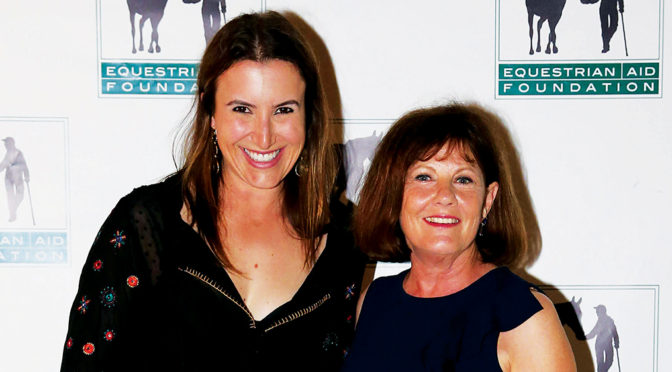Equestrian Aid Foundation Stands Ready To
Help Equestrians In Need
Wellington is the winter equestrian capital of the world, so it shouldn’t be a surprise that among the area’s unique philanthropic endeavors is the Equestrian Aid Foundation, which raises money that is then given as grants to members of the equestrian community in their time of need.
In the horse industry, a catastrophic injury can occur in the blink of an eye. The aftermath of that injury, or a catastrophic illness, can be devastating — never being able to walk again, never being able to ride again, not being able to put food on the table, and, in essence, losing your identity.
“Horses are beloved, yet unpredictable animals. Things can happen or change within an instant,” Equestrian Aid Foundation Executive Director Louise Smith said. “It could happen to pretty much anybody.”
However, since 1996, the Equestrian Aid Foundation has been there to help those in the equestrian industry as they go through such difficult times, helping to rebuild their lives.
The EAF was founded as the Equestrian AIDS Foundation to help those battling that deadly illness. Its mission has since expanded to help all equestrians in need and has provided grants of more than $2.7 million, assisting equestrians in 30 states. “We help with things that insurance won’t cover,” Smith explained.
The EAF is a kind hand, extending hope and support when someone in the industry — riders, grooms, barn managers, trainers, farriers and more — is facing the inability to conduct life as they know it. After all, many equestrians eat, drink, work and sleep barn life. If that is taken away from them, it is devastating.
Smith was drawn to the organization when she learned about what EAF is and how it helps. She discovered that the EAF could have helped a friend of hers, but they didn’t know about it at the time. Therefore, raising awareness is an important goal for Smith, and other EAF leaders.
“The mission of the Equestrian Aid Foundation is to provide emergency grant-based financial support to horse men and women who are coping with catastrophic injury and illness,” Board President Stephanie Riggio Bulger said. “It started as the Equestrian AIDS Foundation, and the mission was to assist horse men and women who were living with HIV and AIDS.”
Approximately 10 years after its inception, the “S” was dropped.
“It became Aid instead of AIDS, and we started helping any injury, illness, you name it, as long as it was catastrophic enough to prevent the person from being able to work, and it caused a loss of income,” Riggio Bulger said.
Based in Wellington, the EAF has impacted equestrians across the country. Many fundraisers, such as local events with stores such as On Course Consignment, BurgerFi, Charming Charlie and Consign & Design, where retailers have held activities, promotions or shopping days, and then donated revenue to the EAF, have a large impact.
“A diverse group of companies have lent their support to the organization,” Smith said. “That’s really amazing, and that really speaks to the generosity of people, not only in Wellington, who support the foundation, sponsor us, participate in our events and activities — they make an impact all across the country.”
The EAF also holds an annual fundraiser, such as last season’s Althea, an equestrian show featuring former Cavalia artists. A newer program with the EAF is the second annual Jump for Charity, taking place at the Hampton Classic Horse Show. Riders are paired with charities and special caps are made, and sold, with proceeds benefiting the charities. Georgina Bloomberg will be riding for the EAF this year.
“It was such a fortuitous pick because she’s an old friend of the foundation,” Riggio Bulger said. “She was a board member for many years, and she’s a dear friend of mine. It was extra special for us that Georgina got picked to be our rider.”
At other competitions, horse show managers are able to support the EAF through its Show You Care program, where a class can be designated as a Show You Care class, where anywhere from five to 50 percent of the entry fee is donated to the EAF. Competitors receive a green lapel ribbon to wear during the show.
Utilizing social media helps raise awareness for the organization, which recently received gold star status from GuideStar, which rates nonprofit organizations. Only a small fraction of the 1.8 million organizations listed in GuideStar achieve gold status.
“It reinforces the work we’re doing and our stature in the community. It’s a gold star on our foundation,” Riggio Bulger said. “It shows we’re doing good work and high-quality work.”
Through EAF grants, individuals who thought they never would be able to walk again are able to receive physical therapy and other medical assistance that is able to make a difference in their mobility and ability to regain their lives.
“When you’re told you’ll never ride again, when you’re told you’ll never have your job again, when you’re told you’ll never walk again, it makes such a difference to get some help,” Smith said. “In the horse world, there’s so many times your life revolves around your barn and your colleagues. And when you’re injured, oftentimes it’s a very lonely experience.”
Whether it is recovering from cancer, complications during back surgery or a debilitating injury, the EAF is there to provide hope, support and funds. Having money is one part of the battle, but knowing there is an organization of people offering support is one of the things that makes the EAF special.
“It’s such a feel-good organization, to hear that all the work we’re doing saves people’s lives, it saves people’s houses, it saves people’s horses, it allows them to keep food on the table while they’re recovering,” Riggio Bulger added. “Sometimes small gestures can have a huge impact.”
For more info., call (800) 792-6068 or visit www.equestrianaidfoundation.org.
